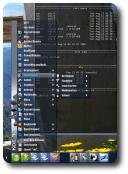
Isolate yourself from noise and life will get easier
 UIET in a technical context is a scenario where users require little or no support. Yes again, the principles described in this post apply to most things in life. Some time ago in the Palm newsgroups, somebody raised a question and then made the observation that few people ever mention Tungsten E devices. The Tungsten E is a modern, lower-end PDA, which is certainly popular, so how could its quiet existence be explained?
UIET in a technical context is a scenario where users require little or no support. Yes again, the principles described in this post apply to most things in life. Some time ago in the Palm newsgroups, somebody raised a question and then made the observation that few people ever mention Tungsten E devices. The Tungsten E is a modern, lower-end PDA, which is certainly popular, so how could its quiet existence be explained?
The discussion groups tend to have a troubleshooting, technical nature, so fault are usually reported while praises are deemed irrelevant and almost frowned upon. Should a person assume that the Tungsten E does not sell well? No. The very few mentionings of it simply imply that the model is reliable and nobody complains about it. Quiet, you see, is often a sign of success. It means that people carry on with their work and never bother to complain. Noise, on the other hand, is an indication of failure. To use a popular example, if Windows hits the headlines very often, it is in the context of security exploits. If people speak to their friends and colleagues about their computer, even while in the pub, this often involves a rant or a request for advice — a cry for help perhaps.
Better Palm PDA’s can be compared to a power plant. Linux servers likewise. We do not hear about Linux success stories quite so often despite the fact that many organisations happily use it. Google and Hewlett Packard are almost shy to admit that they use Open Source for their operations. We rarely hear about server problems that involve Linux because mail servers running Linux can go on for many years without even requiring a reboot. All they do is collect dust and often be forgotten about. The independence of a workstation often leads to forgetting the value of stability and low maintenance requirements.
As we hear about large migrations to Linux across schools in Macedonia, one wonders if the story will ever be used as a case study. When all operations succeed, nobody will bother to say a word. Nobody can fund or promote media commotion either because Linux is not directly bound to a profit-making organisation. Only when matters go out of hand, enemies are able to grab the opportunity and amplify the story of failure. With large budgets, a certain company can also fund and echo deceiving facts — a ‘disinformation’ perhaps — which can only be described as falsified propaganda.
The bottom line: be aware that information (or conversely misinformation) can receive varying levels of amplitude, which is sometimes affected by financial incentives in companies. Also remember that when problems are not echoed, the implication is that work carries on smoothly. People are good at making a fuss when things go wrong, but choose to remain focused and isolated when no problems crop up.
 Time and time again, Bill Gates is urging his engineers to push harder towards successful penetration into the Web. His main rival has been identified already and it has a name: Google. Now begins the fight to win over large corporations that can give an exposure boost and yet more marketing pipes. After talks and negotiations with both sides, AOL appear to be getting close to Google. In stake: communication, media, and more.
Time and time again, Bill Gates is urging his engineers to push harder towards successful penetration into the Web. His main rival has been identified already and it has a name: Google. Now begins the fight to win over large corporations that can give an exposure boost and yet more marketing pipes. After talks and negotiations with both sides, AOL appear to be getting close to Google. In stake: communication, media, and more.





 Filed under:
Filed under:  F I ever undertake a repetltive task that pertains to research, I wish to either automate it using existing (preferably free) tools, script it (e.g. bash, Perl or MATLAB which is by all means expenesive), or costomise the desktop environment to minimize the number of moves, clicks, etc. Productivity through convenience can be achieved using clipboard stacks, mouse focus policies and so forth.
F I ever undertake a repetltive task that pertains to research, I wish to either automate it using existing (preferably free) tools, script it (e.g. bash, Perl or MATLAB which is by all means expenesive), or costomise the desktop environment to minimize the number of moves, clicks, etc. Productivity through convenience can be achieved using clipboard stacks, mouse focus policies and so forth.

 S if
S if 
 UIET in a technical context is a scenario where users require little or no support. Yes again, the principles described in this post apply to most things in life. Some time ago in the Palm newsgroups, somebody raised a question and then made the observation that few people ever mention Tungsten E devices. The Tungsten E is a modern, lower-end PDA, which is certainly popular, so how could its quiet existence be explained?
UIET in a technical context is a scenario where users require little or no support. Yes again, the principles described in this post apply to most things in life. Some time ago in the Palm newsgroups, somebody raised a question and then made the observation that few people ever mention Tungsten E devices. The Tungsten E is a modern, lower-end PDA, which is certainly popular, so how could its quiet existence be explained?
 ET us assemble and review at a list of ideas where Microsoft have been claimed to imitate rather than innovate. Most of all, they appear follow Google’s footsteps,
ET us assemble and review at a list of ideas where Microsoft have been claimed to imitate rather than innovate. Most of all, they appear follow Google’s footsteps, 
 AKERS of Windows are
AKERS of Windows are 